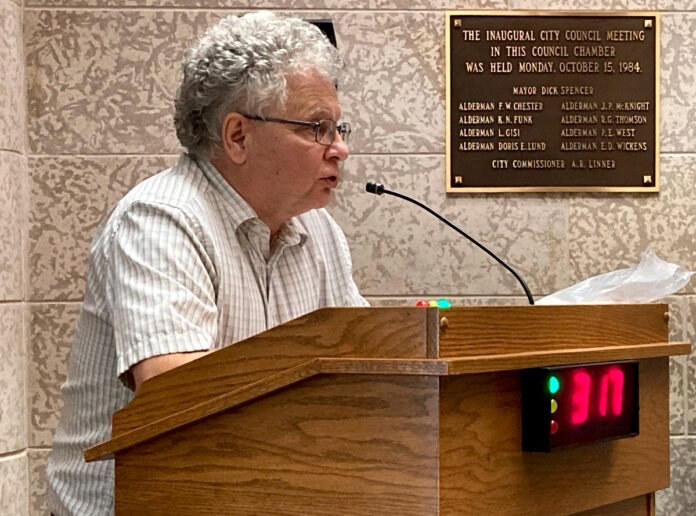
A proposal for a different cold-weather shelter model approved at Tuesday night’s city council meeting means more supports for those coming in from the cold.
City council voted unanimously to approve the heated area under the grandstand at the exhibition grounds as a 20-bed emergency shelter this winter. The proposal was put forward by the YWCA and River Bank Development Corporation with the endorsement of city working groups looking to mitigate the effect of COVID-19 on vulnerable populations.
Tuesday’s approval means work will begin right away to renovate the space to make it ready to act as a shelter, including adding showers, a washer and dryer, lighting and fire suppression for safety and security cameras.
The renovations will be covered by a $30,000 federal grant, while operational funding will consist of $320,000 from the federal reaching home strategy, $31,000 from the ministry of social services and $10,000 from the YWCA.
River Bank Development Corporation received $1 million from the federal government this year through the reaching home program to respond to COVID-19 challenges for the city’s vulnerable population.
The organization manages the fund on behalf of the federal government program.
The new space not only doubles the number of beds available during the cold winter months but also expands shelter hours, allowing clients to be connected to other support services while also allowing for more room for social distancing requirements while accommodating an expected increase in the number of people requiring emergency shelter this year.
“I’m very excited to have the approval,” YWCA executive director Donna Brooks said following Tuesday’s council meeting.
“There was a lot of work by a lot of people that brought this together, and it will help keep our people safe throughout the winter.”
The YWCA has operated a cold-weather shelter for the past seven years. The service was introduced after four people lacking a place to stay froze to death one winter.
While in the past the shelter has been only open from 8 p.m. to 8 a.m., the additional funding this year will allow it to stay open for 18 hours, closing for six hours daily for cleaning.
“At our (existing) homeless shelter at Our House, we only had enough funding to be able to run from 8 p.m. to 8 a.m, and you can’t connect people with services during those hours, because nothing’s open during those hours,” she said.
“With this model, we will be open for extended hours. We’ll be able to connect people to services and not just sending them on the way. We figured that will make a much bigger impact.”
The additional funding received this year will also allow the shelter to ask its clients where they’re from, how long they’ve been in the city and what factors have led to them being homeless. The hope is the data collected might inform future homelessness prevention initiatives.
The city, and the organizations overseeing the shelter, hope that this year’s project can be translated into better, longer-term services for the city’s homeless.
“I do have a dream going past this year. I think it would be an amazing solution for the city,” Brooks told council.
“I see this as a stepping stone to bigger things. We will have a direct link to our homeward bound program, which I see as very positive as well. I’m very excited about this direction.”
That dream, though, won’t happen without some funding. The program funding the shelter this year provides one-time funding. The city’s cold weather shelter only has four beds funded provincially. The rest of the emergency shelter’s services are funded locally through funds raised by the YWCA and other organizations.
The city has funded 24-hour shelters. The emergency shelters, though, have fewer restrictions. As long as someone is behaving, and don’t have to isolate because of illness, they’re welcome at the emergency shelter so they have somewhere safe to stay the night.
Ward 6 Coun. Blake Edwards called on the federal and provincial governments to step to the plate.
“We’re near-crisis mode. I hope the provincial and federal governments … pay attention that Prince Albert is unique. We have certain social issues other cities don’t have, and it’s time they paid attention to us. We need to be loud and we need to be clear that we have these issues that need to be addressed, not with one-time funding. We need these issues addressed on an ongoing basis so we can help rectify the concerns.”
Brooks is hopeful this year’s project can show what a difference a better-resourced emergency shelter would make.
“This is a need in Prince Albert. It’s been a need for a long time,” Brooks said.
“I’m hoping this is the catalyst that helps it take off. We definitely have a need for more funding groups at the table. We have no core funding for men. The only male beds the province funds are four beds of the cold weather shelter, and that’s it. We need them to come to the table to help fund this as well as helping fund some of the male beds in our existing shelter.”
The grandstand shelter is aiming for a Nov. 1 opening date. It will operate until April 30. The existing Our House shelter will be available as a ten-bed emergency shelter until the new facility is able to open.

